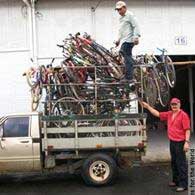This is the VOA Special English Development Report.

Americans bought an estimated 18 and a half million bicycles last year. Some bikes never get much riding. Mostly they gather dust. But a project based in Washington is putting unwanted bikes from the United States to good use in developing countries.
Keith Oberg is the director of Bikes for the World.
KEITH OBERG: "Everybody has an old bicycle, and it is usually not ridden. It sits there in the garage, or basement or shed, going to waste."
Stephen Popick recently had two bikes to donate.
STEPHEN POPICK: "I brought in two mountain bikes that my wife and I have ridden for the past ten years. My bikes wouldn't fetch a nice price and wouldn't be worth trying to sell, but they could be useful to somebody else."
Bikes for the World collects bicycles and delivers them at low cost to community programs in developing countries. It shipped more than 5,000 bikes during the first eight months of this year. Last year it shipped about 10,300.
The bicycle recycling program is one of the largest in the United States. It is a sponsored project of the Washington Area Bicyclist Association.
Bikes for the World began in 2005. Since then it has shipped more than 40,000 bikes to communities in Africa, Latin America and the Caribbean, says director Keith Oberg.
KEITH OBERG: "We work currently with partners in seven countries actively -- in Uganda, Ghana. We're talking to an organization that we would like to ship to in Liberia. We have shipped to Namibia and the Gambia in the past. And in Central America we ship to Panama, Costa Rica, Honduras, Guatemala, and we are talking to two organizations in El Salvador."
Bikes for the World partners with nonprofit groups in the United States to collect unwanted bikes. Then it works with nonprofits in the other countries to get the bikes to organizations and individuals that need them the most.
For example, the Bicycle Empowerment Network Namibia uses the bikes to provide transportation for health workers. That makes it possible for them to visit more patients each day. The organization also has bicycle ambulance services to transport the sick.
The Bicycle Empowerment Network also provides training and support to help local organizations and individuals open bike shops of their own. The businesses sell the recycled bikes at low cost and provide repair services. Many of the organizations use the money they earn to help pay for other community projects.
And that's the VOA Special English Development Report, written by June Simms with additional reporting by Susan Logue. You can learn about other organizations working in the developing world at voaspecialenglish.com. And you can also find us on Twitter and YouTube at VOA Learning English. I'm Steve Ember.
Related stories:
Subway bike ban stays put
On your bike: Istanbul to Shanghai
Bikes a lost passion in the age of cars
More and more Americans bike their way to work
(Source: VOA 英语点津编辑)